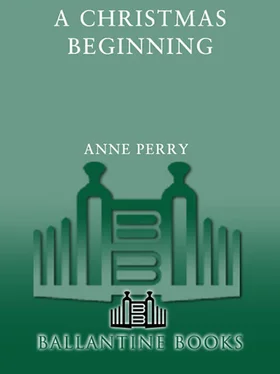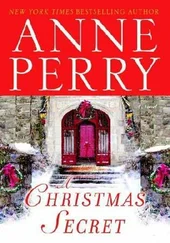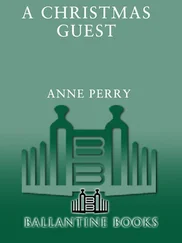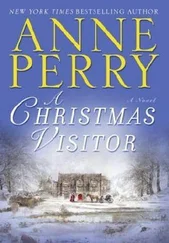The rest of the service passed by him in a blur of sound, beautiful and meaningless, like the splashes of color the sunlight painted through the windows.
Afterwards he stood in the bright winter stillness as the congregation came outside again, talking to each other, shaking the vicar by the hand, milling around exchanging gossip and good wishes.
Someone recognized him as a stranger and invited him to be introduced. He moved forward without thought as to what he was going to say, and found himself shaking the hand of the vicar, Reverend Arthur Costain, and offering his name but not his police rank.
“Welcome to Anglesey, Mr. Runcorn,” Costain said with a smile. “Are you staying with us over Christmas, or perhaps we may hope you will be with us longer?”
In that instant Runcorn made his decision. Melisande and Barclay already knew his profession, but he would tell no one else. He was not ashamed of it, but knowledge that he was a policeman made many people uncomfortable, and their defense was to avoid him.
“I will stay as long as I can,” he replied. “Certainly until the New Year.”
Costain seemed pleased. “Excellent. Perhaps you will call at the vicarage some time. My wife and I would be delighted to make your better acquaintance.” He indicated the woman beside him, who had turned to welcome the girl in green during the service. Upon closer inspection, she was more interesting than he could have guessed from several rows behind. She was not as beautiful as her younger companion, but there was a strength in her face which was unusual, full of both humor and patience. Runcorn found it instantly pleasing, and accepted the invitation, only then realizing that the vicar, at least, had said it as a matter of form. Runcorn blushed at his own foolishness.
It was Mrs. Costain who rescued him. “Forgive my husband, Mr. Runcorn. He is always hoping for new parishioners. We shall not press you into staying beyond your pleasure, I assure you. Is this your first visit to the island?”
He recognized her kindness with surprise. As a member of the police, he was not used to such acceptance from her social class. He had lost his sense of where Melisande was in the crowd, but he knew precisely where Barclay was standing, only yards away, looking at him with distaste. How long would it be before he told Mrs. Costain that Runcorn was a policeman?
But Barclay was not actually looking at Runcorn, he was staring at the girl in green, his eyes so intent on her face that Runcorn knew she must be aware of it, even uncomfortable. There was a brooding emotion in Barclay that seemed a mixture of longing and anger, and when the man with auburn hair who had also watched her approached, his face tight and bitter, for an instant the tension between her and Barclay was so palpable that others were momentarily uncomfortable as well.
“Morning, Newbridge,” Barclay’s voice was curt.
“Morning, Barclay,” Newbridge replied. “Pleasant weather.”
Everyone else was silent.
“I doubt it will last,” Barclay responded.
“Do you imagine we will have a white Christmas?” Reverend Costain put in quickly. “It is in little over a week now. It would be nice for our party.”
Barclay’s eyebrows rose. “White?” he said sarcastically, as if the word held a dozen other, more pungent meanings. “Hardly.”
The girl in green glanced over at him with amusement and then a sudden little shiver, hunching her shoulders as though she were cold, although she was well dressed and there was no wind.
“Olivia?” Costain said anxiously, as if to distract her. “Come meet our visitor, Mr. Runcorn. Mr. Runcorn, my sister, Miss Olivia Costain.”
“Don’t fuss,” his wife’s voice was soft. Had Runcorn not been standing so close he would not have heard her.
The vicar was visibly disconcerted. He looked from Barclay to Olivia and clearly did not know how to address the deeper meaning that was understood between them. The attempted introduction was lost in the tension between them.
Barclay nodded curtly and walked over towards Melisande, who was waiting for him on the path by the lych-gate. Runcorn watched him go, and then for a moment his eyes met Melisande’s and he was unaware of anyone else. Newbridge brushed past him, breaking the moment. He reached Olivia and said something to her. She replied, her voice cool and light. Her words were courteous, her face almost empty of expression. Then she turned and walked away. Runcorn was certain in that instant that she disliked Newbridge.
He thanked Mrs. Costain for her kindness, glanced briefly at the others in acknowledgment, then excused himself. He made his way across the graveyard between the headstones, the carved angels, and the funeral urns and into the shadow of the yew trees beyond. He walked out of the farther gate into the road, his mind still whirling.
It was his profession to watch people and read reactions. There was so much more to investigating than attending to the words given in an answer. It was as much the way these words were said, the hesitations, the angle of the head, the movement and the stillness that told him of the passions beneath. That small group in the churchyard had been torn by emotions too powerful to control except with intense effort. The air was heavy, tingling on the skin like that before the breaking of a storm.
In spite of his separateness, his observation of it so intellectually cool, he was as much a victim as any of them. He was just as human, as vulnerable and every bit as absurd. What could be more ridiculous than the way he felt about Melisande, a woman to whom he could never be more than a public servant that she had been able to assist, because she had had the courage to do the right thing in spite of her brother’s disapproval?
He went back to Mrs. Owen’s house because he knew she had cooked Sunday dinner for him and it would be a graceless thing not to return and eat it, despite already feeling as if the comfortable walls of the house would close him in almost unbearably. And the last thing he wanted was trivial conversation, no matter how well meant. But he was a man of habit, and he had learned the cost of bad manners.
At least he had an excuse to leave quickly. The weather being exceptionally pleasant for December, he was determined to walk as far as he could and still return by dusk. The wild, lonely paths along the shore with the turbulent noise of breaking water and screaming gulls fit his mood perfectly. It was nature eternal and far beyond man’s control. It was an escape to become part of it, simply by hearing the sounds, feeling the wind in his face, and looking at the limitless horizon. It was big and impersonal, and that comforted him. He saw in it a kind of truth.

The next day Runcorn walked the shore all the way from Beaumaris north and east to Penmon Point. He stood and stared at the lighthouse and Puffin Island beyond. The day after he went in the other direction, all the way past the Menai Bridge until he could see the great towers of Caernarfon Castle on the opposite shore, beneath the vast, white-crowned peaks of Snowdonia. The following day he walked aimlessly in the hills above Beaumaris until he was exhausted.
Even so, he did not sleep well. He rose at seven, shaved and dressed, and went outside into the winter dawn. The air had a hard edge of ice on it, so sharp he gasped as he breathed it in. But he found a perverse pleasure in it, also. It was clean and bitter, and he imagined he could see the distances it had blown across, the dark, glimmering water and the starlight. Eight days to go. Perhaps they would have a white Christmas after all.
Without realizing it he had walked uphill towards the church again. Its tower loomed massive against the lightening sky. He went in through the lych-gate and up the path, then around through the graveyard, picking his way across the grass crisp with frost. The dawn was sending pale shafts of light up in the east and throwing shadows from the gravestones and the occasional marble angel.
Читать дальше











